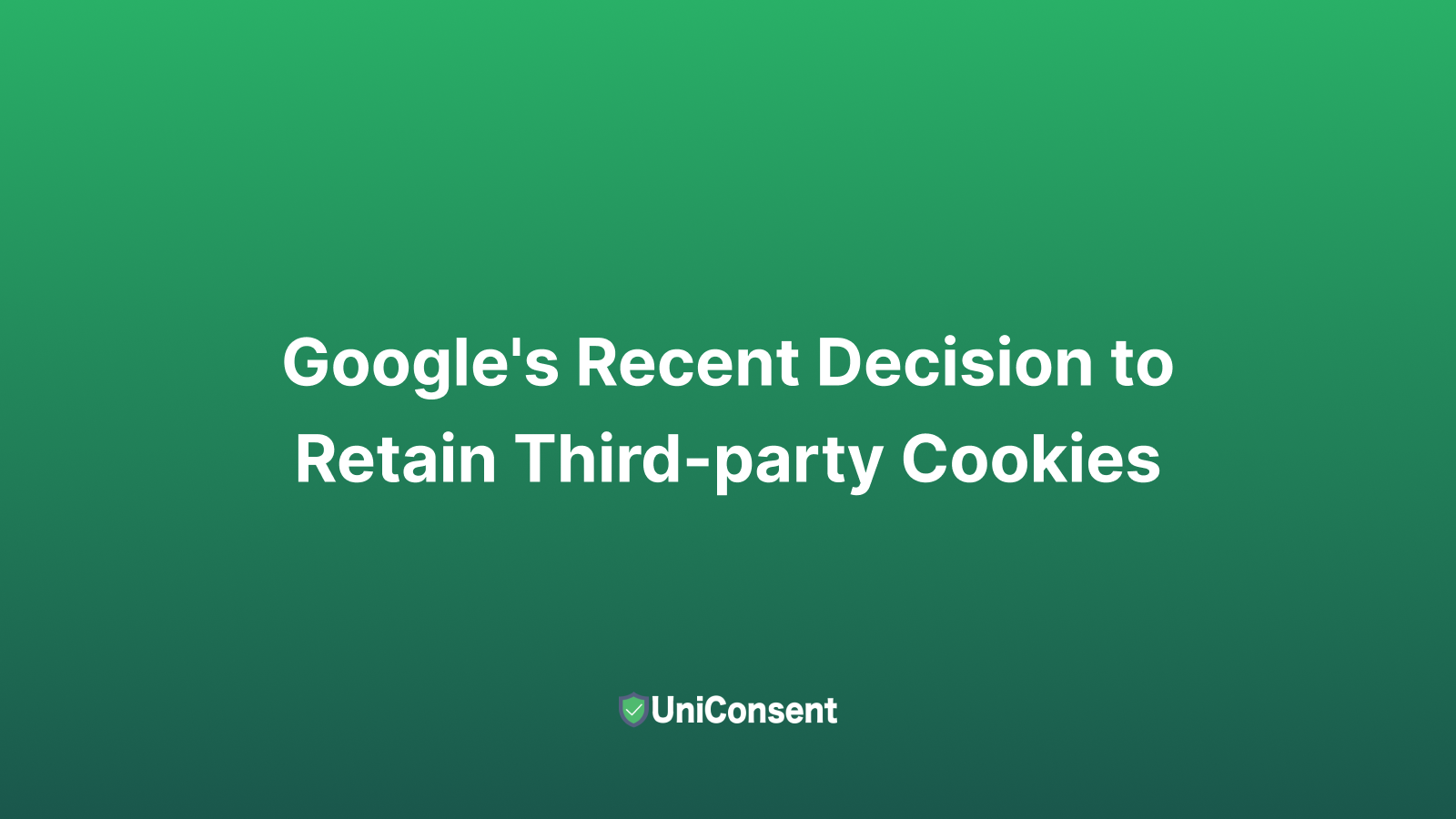Google's Recent Decision to Retain Third-party Cookies
UniConsent
Inhaltsverzeichnis
Google's recent decision to keep third-party cookies in Chrome has sent shockwaves through the digital advertising industry.
After years of preparing for a cookie-free future, this unexpected shift highlights the critical role of user consent and the need for powerful consent management platforms like UniConsent to build and maintain consumer trust.
 Google's Recent Decision to Retain Third-party Cookies
Google's Recent Decision to Retain Third-party Cookies
The Changing in Privacy Landscape and Industry Impact
Third-party cookies have been the mainstay of targeted advertising for years, allowing marketers to deliver personalized ads by tracking users' movements across the web. Browsers such as Mozilla Firefox and Safari already block third-party cookies to enhance user privacy. Google's initial plan to phase out third-party cookies in Chrome was delayed due to industry lack of preparation and regulatory issues, leading to their recent decision to introduce one-time prompts targeting user preferences.
Google's decision to keep third-party cookies has many in the digital advertising ecosystem scrambling to re-evaluate their strategies. The move, while shocking, reflects the challenge of balancing privacy concerns with the needs of advertisers and publishers. The industry has begun investing heavily in alternative solutions and now must move forward in an environment where old methods still apply.
Google's updated approach emphasizes user choice, allowing individuals to make informed decisions about their privacy settings. The move is designed to balance privacy and advertising performance to ensure users retain control over their data while advertisers can still reach their audiences. However, this shift highlights the need for transparent consent mechanisms, where users understand and agree to how their data is used.
Key Concerns for Publishers
-
Data Privacy and Compliance
Because third-party cookies are still in operation, publishers and brands are responsible for complying with strict data privacy laws such as GDPR and CCPA.
Publishers should keep developing and implementing privacy-first policies. Invest in technology that improves user consent management and data protection. Use first-party cookies where possible.
-
Consumer Trust
Consumers are increasingly aware of and concerned about their online privacy and how companies handle it. Google's inconsistent decisions can create confusion and potentially erode trust.
Publishers should maintain transparency with consumers about data use. Reinforce your commitment to privacy through clear communication and a privacy policy prioritizing consumers.
-
Ad Spend and ROI
The uncertainty surrounding cookie deprecation makes it difficult to effectively allocate advertising budgets and accurately measure ROI. Additionally, with the transition from Universal Analytics to Google Analytics 4, many are still learning and adapting to the new realities of analytics performance in Chrome.
Publishers should use this extended time to test and refine new tracking solutions, especially server-side methods like postback tracking. Diversify your advertising strategy to include first-party data and contextual advertising.
-
Technological Adaptation
The industry is in a constant state of change, investing in new technologies but still relying on old ones.
Publishers should balance investments in emerging privacy-preserving technologies with the optimization of existing cookie-based systems. Prepare for future changes with server-side tracking and advanced analytics.
Build Consumer Trust with UniConsent
In the post-third-party cookie world, privacy issues are paramount and businesses must prioritize transparency and user control. UniConsent plays a key role in enhancing user trust and ensuring compliance with privacy laws. As a comprehensive consent management platform, UniConsent enables enterprises to efficiently capture, manage and record user consent.
-
Transparency and Control
Streamline compliance with GDPR, CCPA, and LGPD, UniConsent ensures users are fully informed about data collection practices and provides easy-to-use tools to manage their consent preferences. This transparency is crucial in building trust and empowering users.
-
Regulatory Compliance
As privacy regulations such as GDPR and CCPA become increasingly stringent, UniConsent helps businesses stay compliant by providing powerful consent management solutions. This compliance is critical to avoiding legal consequences and maintaining consumer trust.
-
Enhanced User Experience
UniConsent enhances user experience with customizable CMP UI and integrated seamless consent management. When users use a unified and consistent interface to take control of their data, they are less likely to feel invaded, which increases engagement and loyalty.
-
Data Security and Privacy
By complying with the law through multiple privacy policies, UniConsent ensures that user data is processed securely and in compliance with privacy regulations. This commitment to data security further enhances consumer trust and reduces the risks associated with data breaches.
Moving Forward with UniConsent
Google decided to keep third-party cookies in place while offering a reprieve. This highlights the importance of continued innovation and adjustments to privacy practices and tracking technologies.
Google’s decision to retain third-party cookies while enhancing user choice highlights the need for robust consent management solutions.
UniConsent is providing businesses with the tools to manage user consent transparently and compliantly.
By prioritizing transparency, control, and data security, UniConsent helps build consumer trust, which is critical to thriving in the post-third-party cookie era.
About UniConsent
UniConsent CMP is a globally recognized and certified Consent Management Platform (CMP) catering to leading publishers and serving tens of millions of users daily. By providing a seamless privacy experience, UniConsent CMP helps businesses navigate the post-GDPR era and meet the evolving demands of data protection regulations. Contact us to learn more: hello@uniconsent.com
Leading Consent Management Platform
Compliant with GDPR, CCPA, COPPA, LGPD, PECR, PDPA, PIPEDA, and more.
Activate Google Consent Mode UniConsent to enhance the accuracy of your Google Analytics and Google Ads conversion data.
Set up Google Consent Mode →Beginnen Sie damit, Ihre Website und Anwendung gemäß EU-DSGVO, US-CPRA, CA-PIPEDA usw. konform zu machen
RegistrierenRessourcen für die Einwilligungsmanagement-Plattform
Beginnen Sie damit, Ihre Website und Anwendung gemäß EU-DSGVO, US-CPRA, CA-PIPEDA usw. konform zu machen
Registrieren